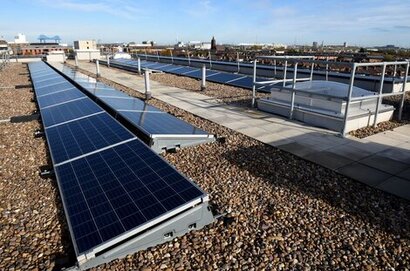
The University is one of thirteen international partners taking part in the project, which is funded by the European Union’s research and innovation programme Horizon Europe within the framework of the Green Deal Initiative with 4.25 Million Euros (approximately £3.75 million).
Currently, silicon is the material of choice for the fabrication of solar cells. However, the technology has limitations as the production of silicon solar cells is a high-energy process. Perovskite solar cells represent an alternative to silicon as their efficiency is very close to that of silicon cells and fewer CO2 equivalents are emitted during their production. In addition, the temperatures required during production of perovskite solar cells are lower, which saves costs and energy. However, perovskite cells are less stable and consequently have a shorter life span than silicon cells which prevents their broader commercialisation. In addition, the best performing perovskite materials contain lead, which is harmful to health and environment.
The SUNREY project, which stands for ‘Boosting SUstaiNability, Reliability and EfficiencY of perovskite PV through novel materials and process engineering’, will investigate how to make solar cells more sustainable and efficient and with lower lead content. It will also look at novel charge transport and electrode materials, cost efficient deposition techniques, barriers and device encapsulation, as well as process optimisation.
Simulation of device and degradation mechanisms are a central instrument for reaching these goals. Life cycle, circularity and stability analysis as well as lifetime analysis under realistic lab conditions in an accredited laboratory are accompanying this development.
The project, which is being coordinated by the Fraunhofer Institute for Applied Polymer Research IAP in Potsdam, Germany, will harness the research strengths of 13 partners including research institutes, universities, and companies from all over Europe. Teesside University, along with the University of Leicester, is one of two UK partners taking part in the project. Forging a smarter, greener industrial economy through the design of novel and disruptive technologies is central to Teseside University’s research strategy.
The University's £13.1 million Net Zero Industry Innovation Centre is nearing completion and will position Teesside firmly at the heart of the UK’s green industrial revolution.
“We are delighted to be taking part of this project which is destined to have a major impact on the production of renewable energy” said Professor David Hughes, Associate Dean (Research and Innovation) in the School of Computing, Engineer & Digital Technologies at Teesside University. “Making perovskite solar cells more efficient and sustainable will enable us to harness the power of the sun more effectively, with minimal environmental impact. This technology will be of vital importance as the world looks to a future without fossil fuels.”
For additional information:

